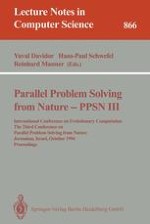1994 | ReviewPaper | Buchkapitel
Step-size adaptation based on non-local use of selection information
verfasst von : Andreas Ostermeier, Andreas Gawelczyk, Nikolaus Hansen
Erschienen in: Parallel Problem Solving from Nature — PPSN III
Verlag: Springer Berlin Heidelberg
Enthalten in: Professional Book Archive
Aktivieren Sie unsere intelligente Suche, um passende Fachinhalte oder Patente zu finden.
Wählen Sie Textabschnitte aus um mit Künstlicher Intelligenz passenden Patente zu finden. powered by
Markieren Sie Textabschnitte, um KI-gestützt weitere passende Inhalte zu finden. powered by
The performance of Evolution Strategies (ESs) depends on a suitable choice of internal strategy control parameters. Apart from a fixed setting, ESs facilitate an adjustment of such parameters within a self-adaptation process. For step-size control in particular, various adaptation concepts were evolved early in the development of ESs. These algorithms mostly work very efficiently as long as the relative sensitivities of the parameters to be optimized are known. If this scaling is not known, the strategy has to adapt individual step-sizes for the parameters. In general, the number of necessary step-sizes (variances) equals the dimension of the problem. In this case, step-size adaptation proves to be difficult.The algorithm presented in this paper is a development based on the derandomized scheme of imitative step-size control. The new adaptation concept uses information accumulated from the preceding generations with an exponential fading of old information instead of using information from the current generation only. Compared to the conventional adaptation scheme, this enables a less locally determined step-size control and allows a much faster adaptation of individual step-sizes without increasing disturbing random effects and without additional evaluations of the fitness function. The adaptation of the general step-size can be improved as well.
